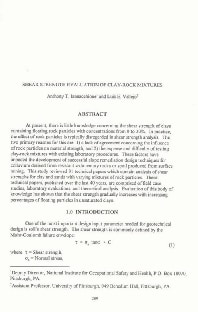Mining Publication: Shear Strength Evaluation of Clay-Rock Mixtures
Original creation date: January 2000
Authors: AT Iannacchione, LE Vallejo
NIOSHTIC2 Number: 20020960
Slope Stability 2000. Geotechnical Special Publication No. 101, Griffiths DV, Fenton GA, Martin TR, eds., Reston, VA: American Society of Civil Engineers, 2000 Jan; :209-223
At present, there is little knowledge concerning the shear strength of clays containing floating rock particles with concentrations from 0 to 30%. In practice, the effect of rock particles is typically disregarded in shear strength analysis. The two primary reasons for this are: 1) a lack of agreement concerning the influence of rock particles on material strength, and 2) the expense and difficulty of testing clay-rock mixtures with existing laboratory procedures. These factors have impeded the development of successful slope remediation design techniques for colluvium derived from resistant sedimentary rocks or spoil produced from surface mining. This study reviewed 31 technical papers which contain analysis of shear strengths for clay and sands with varying mixtures of rock particles. These technical papers, published over the last 40 years, are comprised of field case studies, laboratory investigations, and theoretical analysis. Evaluation of this body of knowledge has shown that the shear strength gradually increases with increasing percentages of floating particles in unsaturated clays.

NIOSHTIC2 Number: 20020960
Slope Stability 2000. Geotechnical Special Publication No. 101, Griffiths DV, Fenton GA, Martin TR, eds., Reston, VA: American Society of Civil Engineers, 2000 Jan; :209-223
- Analysis of Bench Crest Performance at the Yellowstone Mine: A Case Study
- Applications of Ground-Based Radar to Mine Slope Monitoring
- Applications of the Point Estimation Method for Stochastic Rock Slope Engineering
- Assessing and Monitoring Open Pit Mine Highwalls
- Creep Along Weak Planes in Roof and How It Affects Stability
- Effects of Far-Field Shearing Deformation on Fracturing Around an Underground Opening
- Estimation of Shear Strength Using Fractals as a Measure of Rock Fracture Roughness
- Identifying Moisture Sensitive Roof Rocks in Coal Mines
- Roof Bolt Response to Shear Stress: Laboratory Analysis
- Shear Origin of Tension in Excavation-Induced Fractures